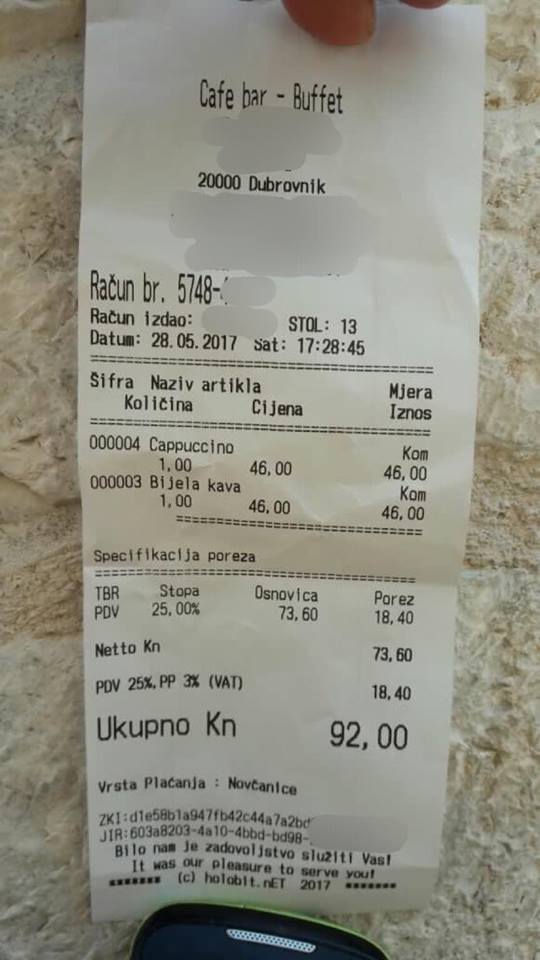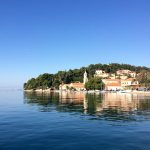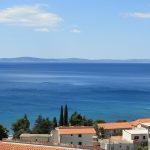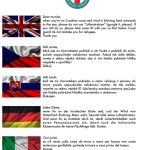How do you know summer is just around the corner if you live in Croatia? The temperatures go up, you start noticing an increasing number of tourists, and the general public inexplicably gets worked up over coffee prices in Dubrovnik.
Every single year, close to the end of May, a photo of a receipt from a random bar in Dubrovnik pops up on one of the social networks. Hvar, Korčula and similar destinations occasionally make a guest appearance. Southern Dalmatia seems to be the theme here, as it attracts the largest number of visitors, but we’ll stick with Dubrovnik, the belle of the ball.
Anyway, there’s your receipt, stating a number that’s way higher than what you’d usually pay on your daily caffeine quests. In a couple of hours, the local media is burning with headlines such as ‘You won’t believe the prices in Dubrovnik!!!’ or ‘Who in Croatia can afford this?!!’ or ‘Tourist charged a million kuna for coffee!!’, and the commenting vultures quickly gather to caw and spit and bicker to let everybody know they think the price is too high. Greedy business owners, shamelessly stealing from the humble working man.
Here’s the latest example that ceremonially marked the beginning of summer 2017:

Someone paid 46 kuna for a cappuccino and 46 kuna for a latte, snapped a photo, it ended up on Facebook, and the crowd went berserk.
The plot unravels in the exact same manner every year: first you have the complainers, screeching about the great cosmic injustice of prices in Dubrovnik and its residents thinking too highly of themselves. Then you have the apologists, pointing to the reasonable argument that every other tourist destination in the world, along with some of the prominent European capitals, charges a minimum of 5-6 euro for coffee at prestigious locations, making the local prices not so big of a deal. At this point, the complainers roll back in to remind you that our standard of living is way lower than in the rest of EU. Talk to me again when the average salary in Croatia rises to the level of those in Austria or Belgium, okay? So it goes, on and on, and no consensus is reached.
The biggest irony here is that we as a nation like to brag about Croatia being the most beautiful country in the world. Forget about America first, Croatia second – we’re at the top of the list. The country of a thousand islands, all of them Adriatic gems; the most precious coastline on this planet where the sea is crystal clear, the villages a millennium old, and the sun shines 365 days a year. The list of cliches doesn’t stop there, and I’m not too proud to admit that I, too, am guilty of using them on a daily basis.
None of that would be a bad thing if we didn’t forget that sense of pride immediately upon seeing coffee cost more than 10 kuna. How can one lousy bar receipt make you disregard the alleged love for your country to the extent that, instead of feeling lucky that millions of people want to enjoy that precious coastline for a couple of days and are prepared to pay good money for it, all you can think to do is spew hate and frustration over the price of coffee in a bar you’ll probably never step your foot in anyway? Most of the aforementioned vultures don’t live in Dubrovnik and don’t have to deal with astonishingly large crowds and traffic collapses on their way to the bank or the post office, but they sure do profit from those crowds even while they’re sitting in their local bars in any other given part of the country. As a friend of mine remarked, it’s time people realise they should be happy tourism in Croatia has it so good that we get visitors who don’t mind paying 50 kuna for a coffee, because a part of those 50 kuna will end up in the public budget. It probably won’t end with the bar owner buying a new BMW at the end of every season.
Nikša Klečak of Dubrovački Dnevnik penned a delightful piece on the outstanding hypocrisy and narrow-mindedness when it comes to this topic. Roman Abramović’s yacht still hasn’t reached the city, says Klečak, so we choose to focus on caffeinated drinks until we have something more interesting to babble about. The prevailing belief seems to be that Dubrovnik residents work from 11 to 11:30, just long enough to con a foreigner who didn’t check the menu beforehand to find out that coffee will cost him 365 kuna. This is an exaggeration, of course, but it might as well be 365 kuna: 25% is going into the state budget, and then further on to finance a new highway somewhere around Sisak. Dubrovnik, however superior it might be, still doesn’t have a highway, the Pelješac bridge remains an abstract concept, and there’s no freeway to connect the city with the airport. “Reaching Zagreb by car takes hours, we wait at border controls like we’re immigrants and not locals on their way home, a plane ticket from Dubrovnik to Zagreb costs more than a ticket to Frankfurt or Nice, but no, what’s really important is how much coffee costs in Dubrovnik.”
Klečak, along with dozens of sensible readers, is right about one thing: not all bars in the city charge 50 kuna for an espresso, and nobody’s forcing you to sit at the one or two that will. Turn a corner and you’ll find your average local bar where coffee costs 10, 12, or 15 kuna. It’s weird, being so personally offended by such an irrelevant thing as coffee prices – at a single location – in a city you either don’t visit often or have never been to at all. Is 46 kuna for coffee a lot in Croatia? Yes. Is it too much? Depends on how you look at it. Is it worth a waste of your energy? Definitely not.
It turns out, we like to brag about tourism, we’ll gladly make our living on tourism, but we don’t know how to live with it. The business owners in Dubrovnik don’t fill their pockets at the expense of the humble working man; they fill the city budget with a daily rent of 5000 kuna or more. That’s roughly a 100 of those 50kn coffees. You don’t want to be the one to help them pay rent? The solution is simple: don’t. Let’s lay this nonsense to rest.









